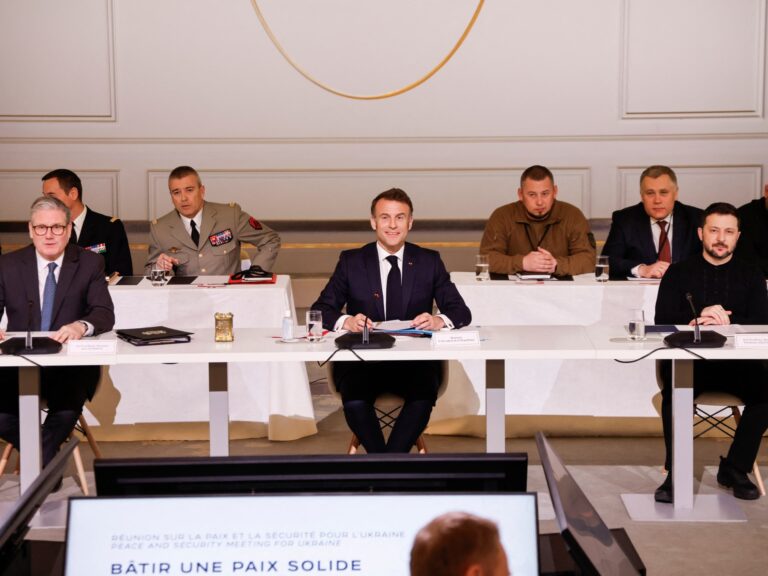France’s Macron floats idea of a ‘reassurance force’ while UK’s Starmer accuses Russia of ‘playing games’.
Ukraine’s allies from across Europe did not all agree on the proposed deployment of troops in the country to back up an eventual peace deal with Russia and only some want to take part, French President Emmanuel Macron has said.
Macron hosted the leaders of nearly 30 countries and NATO and European Union chiefs in Paris on Thursday for the third such summit of the so-called “coalition of the willing”, aimed at strengthening Kyiv’s hand and its military as it pushes for a ceasefire with Moscow.
The summit comes at a crucial juncture in the more than three-year war, with intensifying diplomatic efforts to broker ceasefires amid pressure from US President Donald Trump to end the fighting.
“We do not need unanimity to achieve it,” Macron said after the meeting, announcing that France and the United Kingdom, which are driving the peacekeeping initiative, would forge ahead with a “reassurance force” with the involvement of several countries.
Highlighting differing views among Ukraine’s partners, Italian Prime Minister Giorgia Meloni repeated that “no national participation in a possible military force on the ground is planned”.
Czech Prime Minister Petr Fiala said it was “premature” to discuss sending European troops to Ukraine before the conditions of any ceasefire are known.
‘Reassurance force’
Macron said the members of the “reassurance force” were not destined to be peacekeepers, deployed on the front line or any kind of substitute for the Ukrainian army.
He emphasised that not all of Ukraine’s European allies would be represented in the force, with some states not “having the capacity” and some reluctant due to the “political context”.
The Franco-British delegation would begin talks over where such a force could be deployed.
It would have the “character of deterrence against any potential Russian aggression”, he said.
Macron said that the summit agreed that he and Starmer would together “co-pilot” Europe’s “coalition of action for stable and durable peace”.
The UK-France delegation would also discuss the shape of “tomorrow’s Ukraine army”, Macron said, emphasising the importance of a “strong Ukrainian army, well-equipped for the day after”.
Russian Foreign Ministry spokeswoman Maria Zakharova accused France and Britain on Thursday of hatching plans for “military intervention in Ukraine” under the guise of a peacekeeping mission, warning of a direct military clash between Russia and NATO.

Macron committed to a further 2 billion euros ($2.16bn) in French military support on Wednesday, including missiles, warplanes and air defence equipment. President Volodymyr Zelenskyy said other partners could announce aid packages on Thursday.
The meeting comes days after the US said it signed separate agreements with Moscow and Kyiv for a ceasefire in the Black Sea, but Russia presented conditions.
They included a demand that sanctions be lifted on Russian state agricultural lender Rosselkhozbank and that it be reconnected to the international payment system SWIFT.
The European Union, which ejected Rosselkhozbank from SWIFT, said on Wednesday it can be reinstated only when Russia withdraws its troops from Ukraine.
There was broad agreement at the summit that it would be a strategic error to prematurely ease sanctions on Russia.
“There was absolute clarity that Russia is trying to delay, is playing games, and we have to be absolutely clear about that,” Starmer said after the meeting.
Zelenskyy accused Putin of trying to “divide” Europe and America, slamming “dangerous signals” on lifting sanctions on Russia and urging Washington to be “stronger” towards the Kremlin.
The Ukrainian leader claimed that Moscow had violated a US-brokered pause on attacks on energy infrastructure, alluding to a strike on the southern city of Kherson that killed at least two people and left tens of thousands of people without electricity on Thursday, calling on Washington to react.
Russia, for its part, said Ukraine had targeted an electricity site in the Bryansk region and a gas storage facility in Crimea on Wednesday, and artillery at a power unit in Bryansk on Thursday

